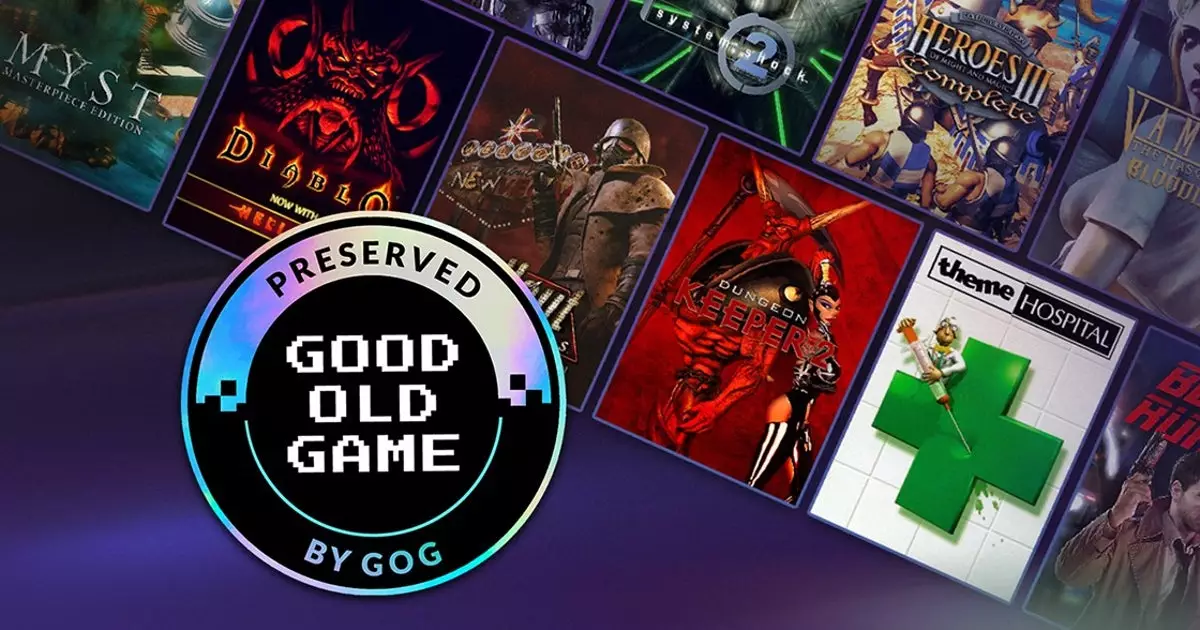Once regarded as a bastion for classic gaming, GOG has notably shifted its strategy over the years. Initially dedicated to preserving older titles, the platform diversified its offerings to include contemporary blockbusters, akin to a slightly less vibrant version of Steam. This evolution raised concerns among gaming purists, who feared that GOG had strayed from its mission of honoring gaming history. However, the recent announcement of the GOG Preservation Program reveals a thoughtful commitment to both the legendary icons of gaming and the technology of today.
The GOG Preservation Program promises to breathe new life into vintage games while ensuring they play smoothly on modern systems. By introducing a unique badge system, GOG enables customers to quickly identify which titles have undergone meticulous restoration work. The badge serves as a mark of quality, suggesting that a game has been carefully updated to minimize technical issues and enhance usability on contemporary devices.
This initiative builds upon previous efforts by GOG to polish older titles, evidenced by successful updates to games like *Alpha Protocol* and the original *Resident Evil* series. By incorporating elements from Valve’s Steam Deck Verified system, GOG increases transparency regarding game performance on necessary hardware.
The company’s approach focuses on resolving bugs, updating software frameworks to include modern video codecs, and ensuring compatibility with Windows 10 and 11. Consequently, GOG is not merely repackaging these classics; they are adapting them for a new generation of gamers who wish to explore their history without the hassle of patching or modding.
Moreover, GOG’s commitment to gaming integrity extends beyond mere accessibility. The games that emerge from the Preservation Program will feature the most complete versions available, including all downloadable content (DLCs), expansions, and even vital materials such as manuals and language options. With offline installers readily accessible and a resolute stance against Digital Rights Management (DRM), GOG is fostering a gaming environment where players can own their experiences rather than simply renting them.
This freshly minted offering debuts with a promising roster of over 100 revitalized classics, encapsulating iconic titles such as the first three *Resident Evil* games, *Diablo*, and *System Shock 2*. Each addition serves as a reminder of why these games are timeless treasures in the industry. However, while nostalgia is valuable, the mere existence of older games may not suffice for many contemporary players; they want functionality. This is aptly summarized in the desire expressed for an improved version of *Fallout: New Vegas*, highlighting that just being a classic is not enough in today’s market.
Despite GOG’s enthusiasm, the pathway to successful preservation is fraught with challenges, especially regarding rights and permissions. The team’s ability to enhance older titles heavily relies on collaborations with original developers and publishers. The reluctance of some companies to grant access to their intellectual properties can severely hinder the program’s aspirations. This reality emphasizes the delicate balance between commercial interests and the noble effort of preserving gaming history.
In an industry where the practice of yanking games from circulation has stirred significant backlash, GOG’s initiative appears to be a timely response to consumer outrage. Legal actions from disgruntled players against publishers underscore the importance of game availability, and GOG seems poised to rise as a trusted custodian of these digital memories.
As GOG strides towards a future where both classic and modern games receive the attention they deserve, the focus on preservation signifies a renewed dedication to the essences of gaming culture. While GOG is not a museum, its commitment to enhancing and preserving titles for current and future generations serves a dual purpose: it nurtures nostalgia while welcoming new players into the fold. With a passionate team driven to revitalize beloved titles, GOG’s Preservation Program heralds a bright era for gaming heritage, ensuring that these cultural artifacts do not fade into obscurity but remain accessible and delightful for years to come.

